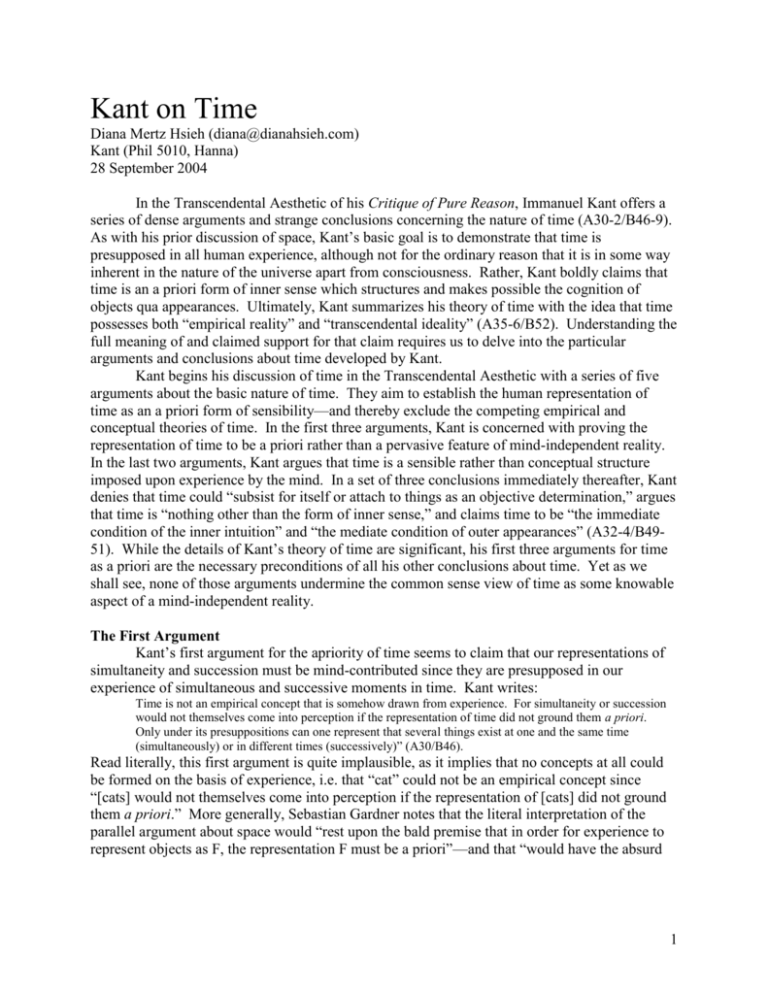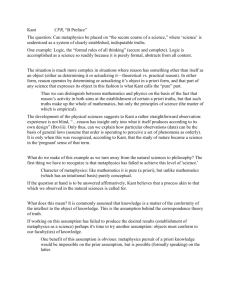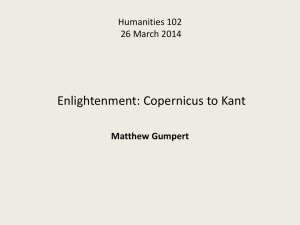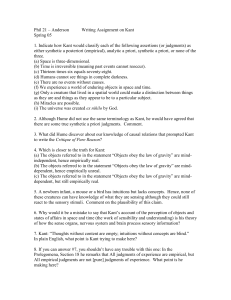kot - Philosophy in Action
advertisement

Kant on Time Diana Mertz Hsieh (diana@dianahsieh.com) Kant (Phil 5010, Hanna) 28 September 2004 In the Transcendental Aesthetic of his Critique of Pure Reason, Immanuel Kant offers a series of dense arguments and strange conclusions concerning the nature of time (A30-2/B46-9). As with his prior discussion of space, Kant’s basic goal is to demonstrate that time is presupposed in all human experience, although not for the ordinary reason that it is in some way inherent in the nature of the universe apart from consciousness. Rather, Kant boldly claims that time is an a priori form of inner sense which structures and makes possible the cognition of objects qua appearances. Ultimately, Kant summarizes his theory of time with the idea that time possesses both “empirical reality” and “transcendental ideality” (A35-6/B52). Understanding the full meaning of and claimed support for that claim requires us to delve into the particular arguments and conclusions about time developed by Kant. Kant begins his discussion of time in the Transcendental Aesthetic with a series of five arguments about the basic nature of time. They aim to establish the human representation of time as an a priori form of sensibility—and thereby exclude the competing empirical and conceptual theories of time. In the first three arguments, Kant is concerned with proving the representation of time to be a priori rather than a pervasive feature of mind-independent reality. In the last two arguments, Kant argues that time is a sensible rather than conceptual structure imposed upon experience by the mind. In a set of three conclusions immediately thereafter, Kant denies that time could “subsist for itself or attach to things as an objective determination,” argues that time is “nothing other than the form of inner sense,” and claims time to be “the immediate condition of the inner intuition” and “the mediate condition of outer appearances” (A32-4/B4951). While the details of Kant’s theory of time are significant, his first three arguments for time as a priori are the necessary preconditions of all his other conclusions about time. Yet as we shall see, none of those arguments undermine the common sense view of time as some knowable aspect of a mind-independent reality. The First Argument Kant’s first argument for the apriority of time seems to claim that our representations of simultaneity and succession must be mind-contributed since they are presupposed in our experience of simultaneous and successive moments in time. Kant writes: Time is not an empirical concept that is somehow drawn from experience. For simultaneity or succession would not themselves come into perception if the representation of time did not ground them a priori. Only under its presuppositions can one represent that several things exist at one and the same time (simultaneously) or in different times (successively)” (A30/B46). Read literally, this first argument is quite implausible, as it implies that no concepts at all could be formed on the basis of experience, i.e. that “cat” could not be an empirical concept since “[cats] would not themselves come into perception if the representation of [cats] did not ground them a priori.” More generally, Sebastian Gardner notes that the literal interpretation of the parallel argument about space would “rest upon the bald premise that in order for experience to represent objects as F, the representation F must be a priori”—and that “would have the absurd 1 consequence that even the representation of colour must be a priori.”1 Given that Kant does regard most ordinary concepts as derived from experience, some more subtle reading is required. Gardner proposes reading the parallel argument about space as follows: If the representation of space were not a priori, then it would be empirical; but if it were formed empirically, then it would be obtained from experience of outer objects. But this is impossible, since outer experience is impossible without the representation of space. So the representation of space must be a priori. In sum, because the representation of space is invoked in the very act of representing world of outer objects, it cannot be based on experience of outer objects. 2 The corresponding argument about time would presumably be that “because the representation of [time] is invoked in the very act of representing world of [inner] objects, it cannot be based on experience of [inner] objects.”3 Henry Allison offers a similar reading of this first argument in Kant’s Transcendental Idealism, albeit with more detail: The argument does not merely contend that we cannot have the representation of things as distinct from ourselves and from each other without also having the representation of space [or time]… What the argument claims is… that the representation of space [or time] functions within human experience as a means or vehicle for the representation of objects as distinct from the self and from each other. Moreover, we cannot… argue in the other direction: we cannot maintain that the awareness of things as distinct from ourselves and from each other is similarly a condition of the possibility of the representation of space [or time].4 Kant and his interpreters thus take our representations of space and time to be a priori preconditions of experience rather than empirical concepts arising out of experience. However, even with Gardner’s and Allison’s clarifications and elaborations, Kant’s argument is less than decisive. In particular, it offers us no compelling reason to suppose that a representation of time (as opposed to the fact of time) is a necessary precondition of the experience of the passage of time. On the common sense view of time as pervasive in the world in itself, both the object and the subject are in time. Consequently, the perceptions of the subject are naturally distributed in time; they do not need to be allocated into simultaneous or successive time slots by any a priori formal structure of the mind. Our basic ideas about time, e.g. that it is linear and unidirectional, would eventually be made explicit by a process of abstraction from the features of time pervasive in our experience. In essence, the fact of time is necessary for the experience of simultaneous and successive moments—but not any representation of time. As such, Kant’s argument does not undermine this common sense view of time. He claims that “simultaneity or succession would not themselves come into perception if the representation of time did not ground them a priori” (A30/B46). Yet on the common sense view, “simultaneity or succession” do not need to “come into perception” at all; the subject’s perceptions of objects are already either simultaneous or successive because both the perceiving subject and the perceived objects are in time. Kant’s claim that “only under [the] presuppositions [of simultaneity or succession] can one represent that several things exist at one and the same time (simultaneously) or in different times (successively)” is similarly irrelevant since on the common sense view the subject need not actively order his representations in time at all (A30/B46). Ultimately, Kant’s first argument for time as a priori begs the question by inferring that time must be actively imposed upon experience by the subject because subject and object are not already in time. Without that latter anti-realist assumption, the Kantian problem of how we manage to represent objects in time simply never arises. 1 Sebastian Gardner, Kant and the Critique of Pure Reason (New York: Routledge, 1999), 75. Ibid., 76. 3 Ibid. 4 Henry Allison, Kant's Transcendental Idealism (New Haven, CT: Yale University Press, 1983), 85. 2 2 The Second Argument Kant’s second argument claims that the possibility of considering time without any appearances of objects but not vice versa shows time to be an a priori structure which makes experience possible. Kant writes: Time is a necessary representation that grounds all intuitions. In regard to appearances in general one cannot remove time, though one can very well take the appearances away from time. Time is therefore given a priori. In it alone is all actuality of appearances possible. The latter could all disappear, but time itself, as the universal condition of their possibility, cannot be removed (A31/B46). Gardner interprets this argument as an adjunct to the first in that it attempts to “rule out a possibility which the first leaves open,” namely that the representation of time and inner sense are “mutually necessary” such that time is “an empirical representation.”5 (Notably, that Libnitzian line of argument involves an epistemic claim about the relationship between the representation of time and experience. In contrast, the common sense view of time discussed above makes an ontological claim about the relationship between time and the stuff of the world.) Generally speaking, if Kant is right that the representation of time is necessary for appearances but appearances are not necessary for the representation of time, then time would seem to have some sort of “priority” over appearances.6 Henry Allison’s examination of three possible interpretations of this argument is revealing, as each interpretation varies in both textual support and argumentative strength. Allison clearly rejects the “logical” interpretation according to which it is “logically necessary for space to be the form of outer sense or time [to be the form] of inner sense” as unsupported by and even contrary to the text.7 Not only does Kant never positively claim that “space (or time) is logically necessary,” but such a view would preclude the possibility of thinking of things-inthemselves, since such requires representation without space and time.8 The failure of the logical argument, however, does not imply the necessity of a “psychological” interpretation of the argument like that offered by Norman Kemp Smith according to which the “the ground upon which the whole argument is made to rest is the merely brute fact (asserted by Kant) of our incapacity to think except in terms of space [or time].”9 Although Allison does not specify his particular reason for rejecting this interpretation, he characterizes it as “questionable,” likely because of the fickleness of the implied standard of imagination.10 So Kant might claim that we can imagine time without appearances but not appearances without time, but others might argue that the opposite claims are equally plausible. In fact, Smith offers just that objection in writing that “We cannot retain time in the absence of all appearances of outer and inner sense. With the removal of the given manifold, time itself must vanish.”11 On either the psychological or logical interpretation, Kant’s second argument thus seems doomed to failure. Not content with such philosophic weakness, Allison develops his own “epistemic” interpretation of this second argument as superior in both textual support and argumentative strength . After discussing the multiple ways in which Kant limits his claims about the 5 Gardner, Kant and the Critique of Pure Reason, 76. Ibid. 7 Allison, Kant's Transcendental Idealism, 86-7. 8 Ibid., 87. 9 Norman Kemp Smith, Commentary to Kant's Critique of Pure Reason, 2nd Edition ed. (New York: Palgrave MacMillan, 2003), 103. 10 Allison, Kant's Transcendental Idealism, 86. 11 Smith, Commentary to Kant's Critique of Pure Reason, 124. 6 3 possibility of representation to appearances, Allison concludes that “Kant’s point… is not that it is either psychologically or logically impossible to remove (in thought) space and time” but “rather that it is impossible to do so and still have any sensible content to intuit.”12 Allison recognizes that this understanding of space and time as the epistemic ground of sensibility cannot establish the apriority of our representations of space and time by itself, for the Leibnizian version relational space and time mentioned earlier, in which our representations of space and time might be “correlative” with appearances such that they “mutually condition” one another, remains a viable option.13 To preclude this alternative theory, Allison claims that both parts of Kant’s second argument must be invoked: The conclusion to be drawn from this is simply that the second part of the claim is equally necessary for the establishment of the apriority thesis. In other words, it is necessary to show both that we cannot remove space and time from the thought of appearances and that we can represent to ourselves space and time independently of these appearances. Together, they prove that the representations of space and time are conditions of appearances and thus a priori.14 Thus it is the asymmetry in the relationship between appearances and space and time, not merely the fact that that space and time are necessary for appearances, which Allison regards as justifying Kant’s conclusion that space and time are a priori representations. From the common sense view of time, the basic problem with this quick inference to the apriority of time is that the second part of the argument, in which Kant simply asserts that we can “take the appearances away from time,” is far from self-evident (A31/B46). Unlike with the first part of the argument that “one cannot remove time [from appearances],” no epistemic interpretation seems possible. Yet when interpreted either logically or psychologically, the claim is rendered irrelevant at best and false at worst. At best: Even if time without appearances did not self-evidently imply a self-contradiction, even if such were coherently conceivable, that fact would not offer any positive knowledge about the actual relationship between time and appearances. Mere logical or psychological possibility, after all, does not imply real-world actuality. Thus the supposed possibility of removing all appearances from time would be irrelevant to the positive claim that time is a priori. At worst: If space and time are even partially constituted by just some of the physical stuff of the universe, then the claims of logical or psychological possibility must be outright denied by the realist as hopeless confusion. If time is ontologically bound up with change, as in Aristotle’s theory of time, then the claim that we can experience or represent time by itself, i.e. without any change whatsoever, would rest upon a faulty philosophic analysis of time.15 In essence then, Kant cannot exclude empirical theories of time by simply claiming that we can remove appearances from time, since that is precisely the sort of claim which will be denied as confused by realist theories of time. More generally, because non-existence isn’t some special kind of existent, the concept of absence is necessarily a relative rather than an absolute concept. It designates the lack of some relevant type of particular against a background plenum of other types of particulars, not the total absence of any and all particulars. Thus even the void of space—the most absolute-seeming absence—is merely lacking known types of matter; the background radiation which pervades the universe is still present. In contrast, removing all appearances from time would require the impossibility of conceiving of an absolute absence. And thus we have a general reason to think that we cannot “take the appearances away from time” at all (A31/B46). 12 Allison, Kant's Transcendental Idealism, 87. Ibid., 88, 84. 14 Ibid., 88. 15 Aristotle, Physics, trans. R. P. Hardie and R. K. Gaye, Book 4, Chapters 10-12. 13 4 Additionally, even if we grant Kant all of his premises about the asymmetry between appearances and time, it’s not clear that we must then conclude that time is an a priori representation. After all, other instances of asymmetry between our ideas does not demonstrate apriority. For example, “that we cannot remove [a stage] from the thought of [a play] and that we can represent to ourselves [a stage] independently of these [plays]” does not prove our representation of a stages to be a priori, but merely a necessary backdrop for plays. Similarly, time could be a necessary backdrop for the physical world in some fashion—and thus necessarily connected with our experience of it. (The question of precisely what that “fashion” is may hopefully be left by the philosopher to the physicist.) The Third Argument Kant’s third argument claims that our necessary principles about time show that the representation of time must be a priori rather than a posteriori. Kant writes: The a priori necessity also grounds the possibility of apodictic principles of the relations of time, or axioms of time in general. It has only one dimension: different times are not simultaneous, but successive… These principles could not be drawn from experience, for this would yield neither strict universality nor apodictic certainly. We would only be able to say: This is what common perception teaches, but not: This is how matters must stand. These principles are valid as rules under which experiences are possible at all, and instruct us prior to them, not through it (A31/B47). In some significant sense, this third argument ought not be counted as an argument for the a priority of our representation of time at all, for it presumes far too much. It presumes the truth of the skeptical claim that necessity cannot be gained from experience, yet denies the skeptical conclusion that knowledge of necessity is impossible. The basic point of the passage thus seems to be drawing out the way in which these two seemingly contradictory ideas may be reconciled via the Copernican Turn. If the mind necessarily does impose time upon our experience, then it is true that (1) our representation of time is not empirical and (2) our representation of time necessarily applies to all experience. All of that is helpful to understanding Kant’s basic project, but given that Kant provides no arguments for his two large premises, the conclusion ought not be regarded as compelling to any empiricist or skeptic. Further Developments Overall, Kant’s three attempts to establish that our representation of time is an a priori structure imposed upon experience by the mind cannot be regarded as successful. Kant’s arguments consistently presuppose substantive theses from his critical philosophy which careful realists/empiricists ought to reject as begging the question. In the first argument, Kant’s conclusion about the apriority of time depends upon the implicit premise the subject and object are not already in time. In the second argument, Kant argues against empirical theories of time with a possibility claim about time sans objects that empiricists can and do reject. In the third argument, Kant presumes the truth of Humean skepticism about the possibility of gaining necessary knowledge from experience, although not all forms of empiricism entail such skepticism. Notably, after considering Kant’s arguments in the Transcendental Aesthetic about space, Sebastian Gardner claims that Kant’s arguments appear weak “until they are restored to their proper and intended Copernican context.”16 The problem, of course, is that Kant’s arguments in the Transcendental Aesthetic need to justify his Copernican Turn, not implicitly rely upon it. 16 Gardner, Kant and the Critique of Pure Reason, 82. 5 Gardner’s attempt to give strength to Kant’s arguments merely shines additional light on the problem. He claims that “what justifies Kant’s going from the necessity of space for the representation of outer object to its a priority, his implicit principle of inference that if a representation R is necessary for empirical representation then R is a priori.”17 Indeed, Kant does seem to be relying upon such a principle throughout his three arguments for the representation of time as a priori. However, the principle is neither self-evident nor supported with argument. Moreover, the principle cannot undermine the direct realist who asserts that the fact of time, but not its representation, is necessary for the experience of time. If we grant Kant the premise that our representations of time and space are a priori, his further conclusions and elaborations mentioned at the outset seem fairly reasonable. Yet Kant offers us no reason to be charitable with that critical premise. Oddly and with some violence to Kantian terminology, the realist/empiricist ought to agree with Kant that time has “empirical reality” in the sense of “objective validity in regard to all the objects that may ever be given to our senses” (A 35/B52). But such empirical reality would be the consequence of the very “absolute reality” of time denied by Kant, not the “transcendental ideality” asserted by him (A 35-6/B52). The empirical reality of time would flow from the fact that time “attach[es] to things absolutely as a condition or property even without regard to the form of our sensible intuition”— quite contrary to the claim that time is “nothing at all if one abstracts from the subjective conditions of sensible intuition” (A 35-6/B52). 17 Ibid. 6









